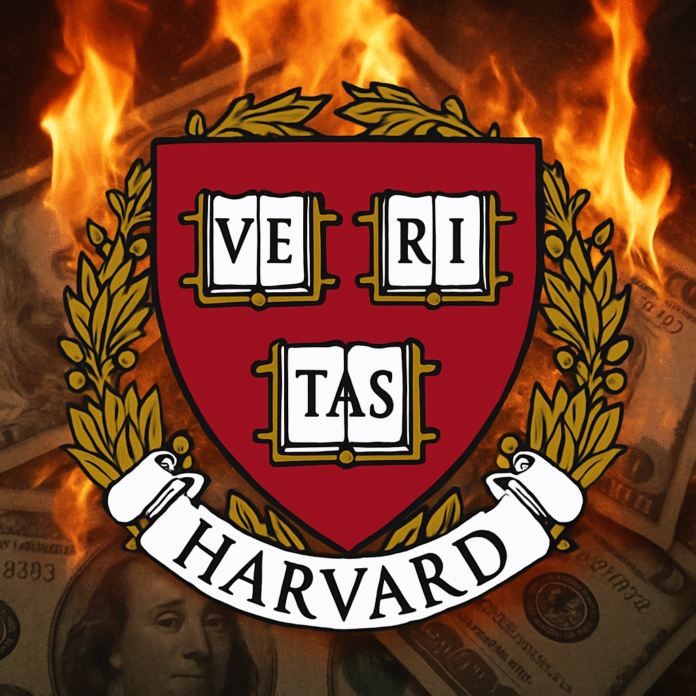The Federal Funding Freeze Escalates as Harvard Defies White House Demands
The Trump administration has slashed another $450 million in federal grants to Harvard University, intensifying an unprecedented financial standoff between the White House and America’s oldest and wealthiest university. This latest cut, announced on May 13, 2025, comes on top of $2.2 billion already frozen last month, bringing the total withheld funding to approximately $2.65 billion.
“Harvard’s campus, once a symbol of academic prestige, has become a breeding ground for virtue signaling and discrimination,” stated the Joint Task Force to Combat Anti-Semitism in their announcement letter. “This is not leadership; it is cowardice.”
The funding cuts represent a dramatic escalation in the administration’s campaign to reshape elite universities, with Harvard at the epicenter of what has become a national battle over campus antisemitism, free speech, and academic independence.
Harvard’s Defiance Triggers White House Response
The latest funding cut came just one day after Harvard President Alan Garber issued a defiant letter to Education Secretary Linda McMahon, stating that while Harvard shares “common ground” with the administration on combating antisemitism, the university “will not surrender its core, legally-protected principles out of fear.”
Harvard filed a lawsuit in April arguing that the government’s threats to pull billions in funding violated its constitutional rights. “No government — regardless of which party is in power — should dictate what private universities can teach, whom they can admit and hire, and which areas of study and inquiry they can pursue,” the university stated in its legal challenge.
The Trump administration’s demands to Harvard include sweeping changes to university governance, admissions policies, and academic programs. According to documents obtained from the Joint Task Force to Combat Anti-Semitism, Harvard must:
- Reform programs and departments that allegedly “fuel antisemitic harassment”
- Ban face masks during protests so participants can be identified
- Implement “merit-based” admissions and hiring policies
- Eliminate diversity, equity, and inclusion (DEI) programs
- Audit faculty and student viewpoints to ensure ideological diversity
- Report foreign students who commit conduct violations to federal authorities
“There is a dark problem on Harvard’s campus, and by prioritizing appeasement over accountability, institutional leaders have forfeited the school’s claim to taxpayer support,” the task force letter stated.
Impact on Harvard and Other Ivy League Institutions
While Harvard’s $53.2 billion endowment provides significant financial cushion, the funding cuts target critical research programs, particularly in the biomedical sciences. The frozen grants affect not only Harvard but also affiliated institutions including Massachusetts General Hospital, Dana-Farber Cancer Institute, and Boston Children’s Hospital.
George Q. Daley, dean of Harvard Medical School, warned that disrupting the decades-long partnership between the federal government and university research would be “self-defeating and injurious to the economy and to U.S. leadership in biotechnology and pharmaceuticals.”
Other Ivy League institutions face similar pressure. Columbia University has already had approximately $400 million in funding frozen, while the University of Pennsylvania, Cornell University, and Brown University have also faced funding cuts or threats. The administration has demanded that these universities implement similar reforms to address what it characterizes as rampant antisemitism and ideological bias.
What President Trump Expects from Harvard
President Trump’s expectations for Harvard are clear: complete compliance with his administration’s demands or face continued financial consequences. The administration has framed these actions as necessary to protect Jewish students from discrimination and to ensure viewpoint diversity on campus.
“Harvard is a disgrace,” Trump stated at a recent rally. “They’re obviously anti-Semitic.”
Beyond addressing antisemitism, the administration’s demands reflect broader policy goals to eliminate DEI initiatives and reshape higher education. The requirement to audit faculty and student viewpoints for ideological diversity represents an unprecedented level of government involvement in university operations.
Harvard has made some concessions, including renaming its DEI office, but has drawn a line at what it considers government overreach into academic independence.
The Path Forward
As this high-stakes standoff continues, the implications extend far beyond Harvard’s campus. The conflict raises fundamental questions about academic freedom, government authority, and the future of federally funded research.
Harvard faces difficult choices: continue defying the administration and potentially lose billions in research funding, or comply with demands it considers unconstitutional. Meanwhile, other universities are watching closely, knowing they could be next.
For now, Harvard maintains that it is addressing antisemitism through internal reforms while defending its institutional independence. The administration, however, shows no signs of backing down from its demands for sweeping changes.
This battle between America’s oldest university and the federal government may ultimately be decided in the courts, with profound implications for the relationship between higher education and government for generations to come.



